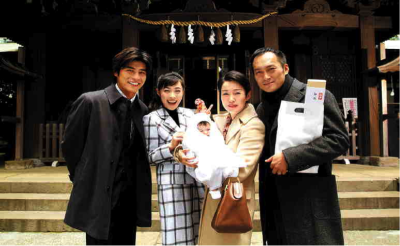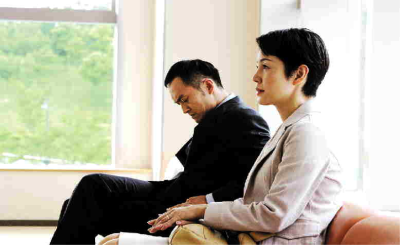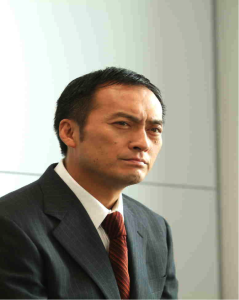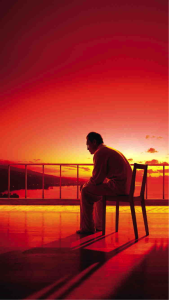By: debbie lynn elias
One of the most exquisitely beautiful and emotional films I have seen in quite some time, MEMORIES OF TOMORROW marks a new chapter for Oscar nominated Ken Watanabe as he not only serves as the film’s executive producer, but takes the lead as Masayuki Saeki in a tender, loving portrayal of a 49 year old man in the prime of his life who learns he has early Alzheimers. This is the role Watanabe was meant to play.

A tough, go-getting advertising executive, Saeki is always on top of his game. A driving force in his company, although a tough nut to crack, his meticulous perfection is unparalleled. Exacting and precise down to the minutest detail, he prides himself on his ability to retain knowledge and even know the Tokyo road system backwards and forwards. At home, he has the same drive, tenacity and demand for perfection, but with less patience or tolerance for his pregnant unwed daughter Rie and slacker future son-in-law than with his employees.

But things take on a different toe when Saeki starts to forget things. First, something as insignificant as Leonardo DiCaprio’s name (okay that may not be so insignificant to many women around the globe). Then missing a freeway exit or forgetting the time.

But when he gets lost in a familiar neighborhood and then forgets a business meeting, red flares start going off. His beloved wife Emiko demands that he see a doctor which is, of course, the last thing Saeki wants to do. Nevertheless, he acquiesces only to be faced with a horrible truth – he is suffering from the early stages of Alzheimers.
As Saeki refuses to believe the diagnosis, we are privy to loving and dedicated relationship between he and Emiko. With the silence of the fog, she slips little notes in his lunch with reminders or instructions. Soon, we see notes appear in the house. Little clocks are drawn. Timers are set. And as time passes, the notes increase, but all the while, Emiko works outside the home allowing Saeki the freedom to still be self-sufficient. He works with his hands creating pottery. He likes to work with his hands.
He can still create. But sadly, this story takes us to the place that no Alzheimer’s patient ever wants to face.
With strong metaphoric ties of man to nature, we watch Saeki go into himself with his fondest memories. The day he proposed to Emiko. The day his daughter was born. They day he chose her name. And while Saeki may be alive on the inside, he is cold and bare on the outside, much like a tree in winter – always standing, alert, absorbing the world around him but seemingly dead. But then Spring always comes and with the warm air and sunshine so do the leaves of a tree. And with Saeki, the arrival of his granddaughter or even a photograph or a touch, cloak him in the same life force as the leaves on the tree. There is hope. There is life.
As I told Ken Watanabe last week during our interview, I would never have thought of him for this role. A remake of “Midway” – yes. But not Saeki. We are talking Oscar gold. The emotion that he brings to the role and to the film is sensitive and both heart-warming and heart-wrenching. This isn’t acting. This is his heart. When I asked him what he drew on, where he found the depth of emotion, he told me a few stories. One, that on reading the book he saw only himself as the person to play Saeki. Roughly same age, same build, same drive and indomitable spirit. He had to do it. But then he talked about his parents. His father suffered a stroke and was left paralyzed for 30 years. Day in and day out, his mother cared for him. Tending to his needs, just as Emiko does in the film. It wasn’t until filming was almost complete that Ken realized that the relationship and emotion and characterizations he was presenting were drawn, in fact, from watching his own parents. Kanako Higuchi is magnificent as Emiko. With the care and tenderness one would shower on a newly planted flower, she tends to Saeki with the same gentle knowing touch.
Hand picked by Watanabe to direct, Yukihiko Tsusumi’s vision is impeccable and beautiful. Simple concise shots, he lets the story unfold and allows the emotionally uplifting performances to fill the screen. Based on the novel by Hiroshi Ogawara, screenwriters Hagaru Sunamato and Uiko Miura capture the essence and eloquence of the original story without missing a tear.
Already an award winner, MEMORIES OF TOMORROW is one of my Must See Films of the Year. There won’t be a dry eye in the house.
Saeki: Ken Watanabe Emiko: Kanako Higuchi
Directed by Yukihiko Tsusumi. Written by Hagaru Sunamato and Uiko Miura based on the novel by Hiroshi Ogawara. Japanese with English sub-titles. (122 min)












